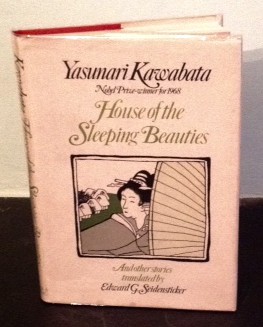Inspiring Older Readers
 posted on 04 Nov 2015
posted on 04 Nov 2015
The House of the Sleeping Beauties by Yasunari Kawabata
Kawabata is, I think, something of an acquired taste. He was Japan’s first ever winner of a Nobel Prize for literature and despite this accolade his reputation in the UK is largely based on his novel, Snow Country. Kawabata saw himself as a literary purist in the sense that he didn’t really engage with main currents in Japanese history and politics – preferring instead a sort of ‘art for art’s sake’ approach to his work.
This book contains an extended short story / novella that provides the title of the volume and two shorter stories – One Arm and Of Birds and Beasts – which make up the collection. However, it is the title story which really makes the book worth getting because it’s an unnerving and intimate meditation on age, beauty, death and voyeurism. Eguchi, a lonely 67 year old man, takes to visiting The House of The Sleeping Beauties – a sort of brothel where old men can spend the night with young girls who have been given drugs to send them into a dead sleep. Each visit results in him having a different girl to contemplate – no sexual act is allowed – and this results in him revisiting past memories, re-evaluating his life and his own sense of morality and self-worth.
Eguchi is initially ashamed of his weakness in visiting the House but finds he has become infatuated by the experience of the proximity he can obtain to the young girls – each very different in terms of physicality and each with an identifiable character despite the fact they never wake.
I personally found the atmosphere of the story oppressive and even slightly creepy. The old man’s ability to invade the person and privacy of the girls is positively tactile and the unease the reader feels is clearly part of Kawabata’s purpose. The nature of old age and the way it can alienate an individual from real, meaningful human contact is heart-breaking – the eventual realisation that we will all die alone as voyeurs of our own youthful past is by no means an original idea but it is, in Kawabata’s hands, an oddly beautiful one.
One Arm is a much shorter and oddly surreal meditation on the fetishisation of an object. In this case the object in question is a woman’s arm that a man is given to take care of overnight, knowing he has been given permission to use it as his own. Having looked after the living, sentient arm for most of the night he eventually decided to swap it for his own – an experience that overloads his senses and his sense of self. In confusion and almost terror, he rips off the borrowed arm and replaces his own. In many ways this story could be described as a piece of magic realism well ahead of its time but in reality it belongs more to the tradition that produced Haruki Murakami who has specialised in using surreal or absurdist metaphor as a comment on personal and social obsession.
The final story in the collection, Of Birds and Beasts, picks up on the theme of social alienation. The central character of this story cannot relate in any meaningful way to other human contact and so he locks himself away with a collection of birds and beasts. He feels that he relates more meaningfully to these dumb creatures but, in reality, he has no affinity with them at all. The birds in particular die with astonishing rapidity in a collection of rather unpleasant ways and he appears to learn nothing from this.
These are three stories in which men live with a fantasy of what it means to be alive and part of a society or community when they are, in fact, trapped in delusions of their own making. Kawabata’s prose is deceptive – simple on the surface but loaded with layers of meaning that make his stories airless and disturbing.
Terry Potter
November 2015